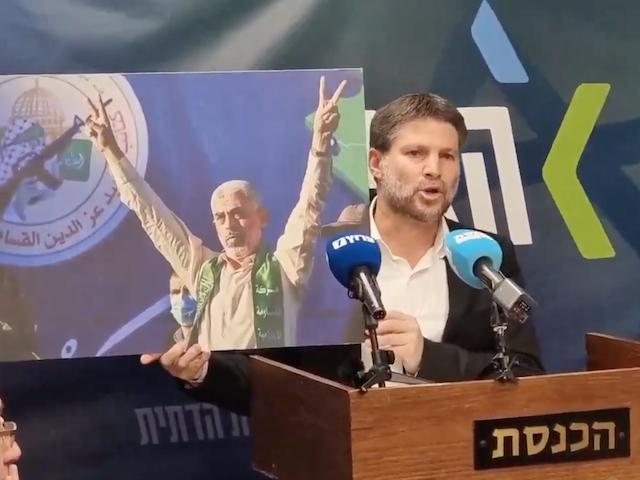'Hamas would not have taken over Gaza and turned it into a giant terror monster,' Finance Minister Bezalel Smotrich said – 'the pioneers who held their ground there were our security belt'.
In a bold and emphatic statement, Finance Minister Bezalel Smotrich asserted on Monday that the tragic massacre of October 7 could have been averted if Jewish settlements had remained in Gush Katif, within the Gaza Strip. His remarks came during the "Katif National Responsibility Conference" held in Yad Binyamin, central Israel, where he passionately defended the strategic importance of these settlements.
The Power of Settlements: A Security Shield
"If there was a Jewish settlement in the Gush Katif area, the massacre would not have happened," Smotrich declared, drawing a direct link between the presence of settlers and the prevention of terror. He emphasized that the settlements acted as a formidable security barrier, preventing Hamas from transforming Gaza into a "giant terror monster." He praised the pioneers who once held their ground in Gush Katif, describing them as the crucial security belt for Sderot and surrounding towns and kibbutzim.
Minister Smotrich at the Katif Conference: "The mas*sacre would not have happened if the Jewish villages in Gaza were still present. Mistakes can be corrected." @IsraelHayomHeb
— Open Source Intel (@Osint613) August 5, 2024
I’m also still not sure why Jews shouldn’t be allowed to live in Gaza in the 21st century… pic.twitter.com/vrK5rj3Bzw
Extending the Principle: Judea, Samaria and Beyond
Smotrich extended his argument to Judea and Samaria, also known as the West Bank, asserting that "where there is no settlement, there is terror." This bold claim underscored his belief in the necessity of Jewish settlements as a preventive measure against terrorism. His remarks highlighted a controversial stance, suggesting that the continued expansion of settlements is integral to Israel's national security.
Critique of the Captive Release Deal
Turning his attention to the ongoing negotiations for the release of captives, Smotrich voiced strong opposition to the current deal on the table. "We all want to bring back the captives," he acknowledged, but stressed that Israeli leaders have a responsibility to avoid deals that jeopardize national security. He criticized the proposed agreement for bringing back very few captives while leaving the rest in Gaza, stating, "It endangers the security of the State of Israel and undermines the achievements of the war."
Herd Mentality in Security Decisions
Smotrich expressed concern over what he termed as "herd mentality" among security heads, warning that the deal would allow Hamas to recover quickly. His remarks highlighted a deep-seated fear that the current approach could undo the hard-won gains of the conflict and embolden Hamas.
Israel’s finance minister, Bezalel Smotrich, has said it is “justified and moral” to let two million civilians in Gaza die of hunger unless Israeli hostages are returned.#GazaGenocide #Israel #Palestine #FreePalestinehttps://t.co/6Sq2bK2O0t
— phaon (@phaonphone) August 5, 2024
Other Voices at the Conference
The conference also featured significant contributions from other key figures. Chairman of the Foreign Affairs and Defense Committee, Yuli Edelstein, addressed the contentious Conscription Law affecting Israel's ultra-Orthodox sector. He criticized political delays and called for practical solutions to meet the IDF's critical needs, urging for logic and focus on the essence of the law.
Humanitarian Aid and International Legitimacy
In a provocative stance, Smotrich implied that blocking humanitarian aid to the Gaza Strip, even at the cost of civilian lives, might be "justified and moral" if it secured the return of hostages. However, he acknowledged the international community's constraints, stating, "We can’t, in the current global reality, manage a war. Nobody will let us cause 2 million civilians to die of hunger even though it might be justified and moral until our hostages are returned."
Control Over Gaza: A Disputed Strategy
Smotrich also argued for Israel to regain full control over the entry of goods into Gaza, opposing the military and Defense Minister Yoav Gallant's stance. He criticized the current handling of humanitarian aid, which he claimed Hamas was exploiting, thereby prolonging the conflict. Despite supporting the idea of resettling Gaza, he clarified that he had not demanded this as a war goal, contrasting with Prime Minister Benjamin Netanyahu’s stance.
סמוטריץ' בכנס קטיף: "אף אחד לא ייתן לנו להמית ברעב 2 מיליון אזרחים, למרות שזה אולי צודק ומוסרי עד שלא מחזירים את החטופים"https://t.co/j7uXaTdKIY pic.twitter.com/h62XL00eaO
— החדשות - N12 (@N12News) August 5, 2024
Conclusion
In his fervent address, Finance Minister Bezalel Smotrich painted a stark picture of the security landscape, linking the presence of Jewish settlements directly to the prevention of terrorism. His remarks stirred controversy and debate, reflecting the deeply divided opinions on Israel’s settlement policy and its broader implications for national security and humanitarian considerations.


